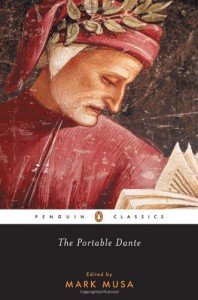Grace and Beauty

This edition of Portable Dante includes the Divine Comedy and the Vita Nuova, both with footnotes.
Dante’s Divine Comedy is perhaps best known for the Inferno which is about Hell. It is, perhaps, a self full-filling view of the human race that it is the Inferno that everyone talks about and not the other sections that deal with Purgatory and Heaven. The human race wants Hell. Perhaps this is due to fear; perhaps it is due to a sense of superiority – he might have been famous, but at least he’s there and I’ll go here.
Today, perhaps Dante’s hell would be a store or mall in the US on Black Friday when all the insane people decide to do their shopping for themselves. I don’t get it. You can sleep in. I hope Dante would feel the same. I can just see Virgil lifting a skeptical eyebrow.
Perhaps the Inferno is what is remembered best because of the punishments and the list of the damned. Perhaps because of the giant heads. In some ways, the other two sections do feel like somewhat of a letdown. This view, however, is flawed because some of the most beautiful poetry is found in these later books. There is something about Dante’s avowed change and the love not only for Beatrice, a famously unconsummated one, but a love for god. This love is for god, not for the pope or religious figures, even though Beatrice is saint like. For those popes tend to appear somewhere else entirely, and considering the recent behavior of a German priest among other things, strangely timely.
The cynicism and righteous indignation of the Inferno is easily forgotten in the absolute beauty and vision of the heavens. If the Inferno is about the missed chances of Divine Love, the heavens confirm the promise. This thesis is somewhat present in the Vita Nuova, which is more in the tradition of courtly love poetry, yet the love expressed for Beatrice leads to a deeper love for human kind as a whole.
If No Exit argues that hell is other people; Dante’s work argues that heaven is mercy towards others.
 4
4








